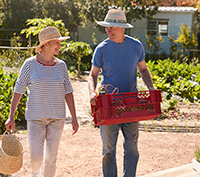
Community composting hubs

Brisbane City Council has partnered with a number of community gardens around Brisbane to help residents turn valuable food scraps into nutrients for soil.
Food waste makes up more than 25% of the average Brisbane kerbside general waste (red lid) bin. Composting helps to reduce the amount of food waste sent to landfill and reduces harmful greenhouse gas emissions. It's an easy way to experience where our food comes from and shows how valuable our food scraps can be in the cultivation and harvesting cycle.
This program encourages residents to regularly contribute their food scraps to a nearby community garden compost bin. Residents who participate also learn new ways to reduce their food waste.
Where are community composting hubs located?
Council has 26 community composting hubs throughout the city and suburbs. Find your nearest Council community composting hub and register to start composting.
View the map to find community composting hub locations and contact details. If you'd prefer to see a table view, use the toggle above the map to move to 'text view'.
Community composting hubs and contact details
Other ways to compost
If you don't have a composting hub nearby, you can compost in other ways:
- download the ShareWaste app to connect with neighbours who will accept your food scraps for composting
- purchase your own compost bin or worm farm with Council's compost rebate
- become a volunteer at an existing community compost hub to get a sense of how the program works.
Register online
Register online to get involved in your local community composting hub.
As a registered participant, you can collect a free kitchen caddy from your local ward office, which can help you collect and transport scraps to a composting hub. Find out about choosing the right caddy. Contact your local ward office ahead of collection to confirm caddy availability.
How to use a community composting hub
On-site signage at hubs makes composting quick and easy. Follow these steps:
- Empty your fruit and vegetable scraps in the 'hungry' bin.
- Add some carbon material from the 'browns' bin and close the lid.
What can I put in a community compost hub bin?
| Yes, place these items in | No, don't place these items in |
|---|---|
Food waste
Other compostable items
|
|
Become a volunteer caretaker at a hub
Our hubs rely on dedicated volunteer caretakers to continue our vital work of diverting food waste from landfill. By volunteering at your local community composting hub, you'll learn composting skills and meet like-minded people, while helping to reduce food waste to landfill.
Email your local community composting hub to find out how you can get involved (see the map or text view above for email details of each hub).
More information
Find out more about composting, worm farming and other organic waste recycling.
If you'd like to learn more, attend one of our free compost and worm farm workshops or register your interest for the Master Composter Course.